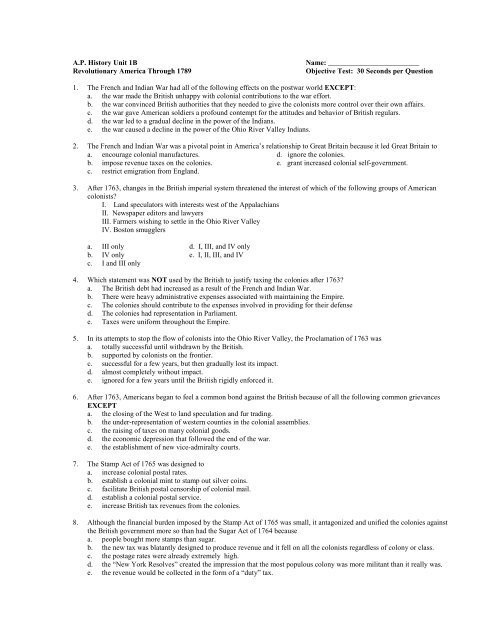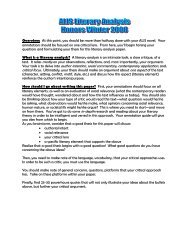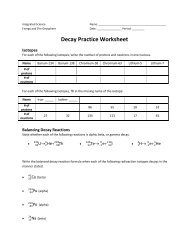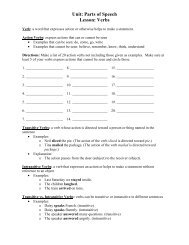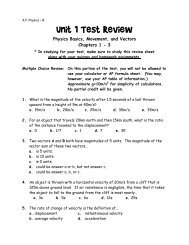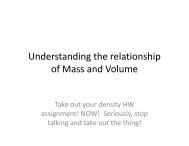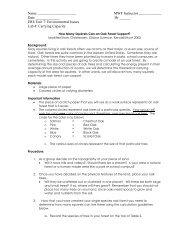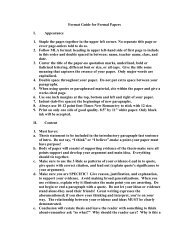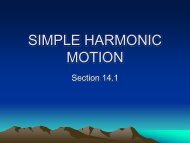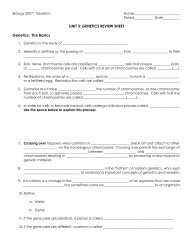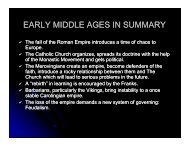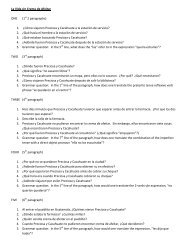9. The Sons of Liberty, organized in response - Arapahoe High School
9. The Sons of Liberty, organized in response - Arapahoe High School
9. The Sons of Liberty, organized in response - Arapahoe High School
You also want an ePaper? Increase the reach of your titles
YUMPU automatically turns print PDFs into web optimized ePapers that Google loves.
27. A major turn<strong>in</strong>g po<strong>in</strong>t <strong>in</strong> the war that led to the Franco-American alliance was the Battle <strong>of</strong>a. Saratoga. c. Yorktown. e. Lex<strong>in</strong>gtonb. Trenton. d. Valley Forge.28. French support for the American fight for <strong>in</strong>dependence was ga<strong>in</strong>ed through all the follow<strong>in</strong>g EXCEPTa. French fears that the colonies might become reconciled with England.b. the diplomacy <strong>of</strong> Benjam<strong>in</strong> Frankl<strong>in</strong>.c. traditional French enmity toward England.d. Louis XVI's sympathy for republican government and philosophy.2<strong>9.</strong> <strong>The</strong> French government supported the American Revolution primarily becausea. <strong>The</strong>re was general support for the political ideals <strong>of</strong> the Enlightenment <strong>in</strong> France.b. An American victory would enable France to recapture Canada.c. Benjam<strong>in</strong> Frankl<strong>in</strong> and his scientific achievements <strong>in</strong>spired the admiration <strong>of</strong> the French.d. France wished to reduce the British Empire and ga<strong>in</strong> <strong>in</strong>fluence <strong>in</strong> North America.e. France’s ally Spa<strong>in</strong> was eager to recapture Gibraltar from Great Brita<strong>in</strong>.30. For the Iroquois Confederacy, the American Revolution led toa. a strengthen<strong>in</strong>g <strong>of</strong> the tribes, because they allied with the Americans, and the British left them alone.b. a strengthen<strong>in</strong>g <strong>of</strong> the fur trade <strong>in</strong> the Ohio River Valley.c. little change <strong>in</strong> their situation, because the Confederacy rema<strong>in</strong>ed completely neutral.d. a weaken<strong>in</strong>g <strong>of</strong> the tribes, because they sided with the Americans, and the British attacked them.e. a weaken<strong>in</strong>g <strong>of</strong> the tribes, because the Confederacy split up, and the Americans attacked those who sided with theBritish.31. Accord<strong>in</strong>g to the Treaty <strong>of</strong> Paris (1783), the United Statesa. secured from England recognition <strong>of</strong> American <strong>in</strong>dependence, with the Mississippi River as its western boundary.b. was granted an <strong>in</strong>terim truce <strong>in</strong> the fight<strong>in</strong>g with England.c. betrayed its territorial agreement with the Spanish.d. received recognition <strong>of</strong> its claims to Canada.e. acknowledge the sovereignty <strong>of</strong> K<strong>in</strong>g George III.32. In discuss<strong>in</strong>g the American Revolution, the basic controversy among historians <strong>in</strong>volves the question:a. Should the British have won easily, or did they face an impossible, Vietnam-style war?b. Was the motivation for the Revolution primarily political ideology or essentially economic and social <strong>in</strong>terests?c. Did the French make a colossal blunder <strong>in</strong> support<strong>in</strong>g the Americans and as a result br<strong>in</strong>g about their own revolution?d. If the Americans really believed what they said <strong>in</strong> the Declaration <strong>of</strong> Independence, why did they not end slavery?e. Did English generals <strong>in</strong>tentionally use strategies that would fail?33. But what do We mean by the American Revolution? Do we mean the American War? <strong>The</strong> Revolution was effected beforethe War commenced. <strong>The</strong> Revolution was <strong>in</strong> the M<strong>in</strong>ds and Hearts <strong>of</strong> the People. A Change<strong>in</strong> their Religious Sentiments <strong>of</strong>their Duties and Obligations. While the K<strong>in</strong>g, and all <strong>in</strong> Authority underhim, were believed to govern, <strong>in</strong> Justice and Mercyaccord<strong>in</strong>g to the Laws and Constitutions derived to them from the God <strong>of</strong> Nature, and transmitted to them by theirAncestors: they thought themselves bound to pray for the K<strong>in</strong>g and Queen and all the Royal Family, and all the Authorityunder them, as M<strong>in</strong>isters orda<strong>in</strong>ed <strong>of</strong> God for their good. But when they saw those Powers renounc<strong>in</strong>g all the Pr<strong>in</strong>ciples <strong>of</strong>Authority, and bent upon the destruction <strong>of</strong> all the Securities <strong>of</strong> their Lives, Liberties and Properties, they thought it theirDuty to pray for the Cont<strong>in</strong>ental Congress and all the thirteen State Congresses, &c.In this extract from an 1818 letter reflect<strong>in</strong>g on the American Revolution, John Adams’ central po<strong>in</strong>t isa. the Revolution <strong>in</strong>volved an <strong>in</strong>tellectual and emotional component that preceded the military one.b. the Revolutionary War had a deep <strong>in</strong>fluence on the religious life <strong>of</strong> America.c. the American revolutionary leadership tried to focus popular hostility aga<strong>in</strong>st the British Crown, rather than aga<strong>in</strong>stParliament.d. <strong>in</strong> the years before the Revolution, the British authorities flagrantly violated the rights and security <strong>of</strong> the Americancolonists.e. Americans always pray for the welfare <strong>of</strong> the political leaders, whoever they may be.34. In the 1770s and 1780s, the majority <strong>of</strong> Americans agreed on all <strong>of</strong> the follow<strong>in</strong>g political assumptions EXCEPT:a. political power should come directly from the people.b. people should have an equal opportunity to succeed <strong>in</strong> life.c. people should enjoy equality <strong>of</strong> condition dur<strong>in</strong>g their lives.d. republicanism should be the foundation <strong>of</strong> a new government.e. a nation should have a large number <strong>of</strong> <strong>in</strong>dependent property owners.
35. <strong>The</strong> state governments that were formed dur<strong>in</strong>g the 1770s exhibited all <strong>of</strong> the follow<strong>in</strong>g characteristics EXCEPT:a. they had written constitutions.b. they forbade governors from hold<strong>in</strong>g legislative seats.c. they had property requirements for vot<strong>in</strong>g.d. they limited the power <strong>of</strong> the executive <strong>in</strong> favor <strong>of</strong> the legislative branche. they adopted the pr<strong>in</strong>ciple <strong>of</strong> universal suffrage.36. In the period just after the American Revolution social and political advances made <strong>in</strong> the United States, <strong>in</strong>cluded all EXCEPT:a. a revival <strong>of</strong> <strong>in</strong>terest <strong>in</strong> school<strong>in</strong>g. c. a greater separation <strong>of</strong> church and state.b. abolition <strong>of</strong> slavery by law throughout the states. d. reform <strong>of</strong> vot<strong>in</strong>g laws lead<strong>in</strong>g to greater participation.37. <strong>The</strong> direct economic and social consequences <strong>of</strong> the American Revolution <strong>in</strong>cluded all <strong>of</strong> the follow<strong>in</strong>g EXCEPT:a. expanded opportunities for settlement <strong>in</strong> the West. d. new opportunities for trade and manufactur<strong>in</strong>g.b. reforms <strong>in</strong> laws <strong>of</strong> <strong>in</strong>heritance. e. confiscation <strong>of</strong> Loyalist property.c. <strong>in</strong>creased property rights for women.38. <strong>The</strong> Articles <strong>of</strong> Confederation provided thata. each state have one vote <strong>in</strong> Congress. d. Congressmen be elected directly by qualified males.b. the chief executive be responsible to Congress. e. a unanimous vote by Congress be required to pass a law.c. Congress consisted <strong>of</strong> two houses.3<strong>9.</strong> <strong>The</strong> Northwest Ord<strong>in</strong>ance <strong>of</strong> 1787 established a precedent for the settlement <strong>of</strong> new areas throughout the United Statesthrough all the follow<strong>in</strong>g provisions EXCEPT:a. immediate statehood for territories on petition <strong>of</strong> five thousand residents and a locally elected legislature.b. encouragement <strong>of</strong> public education.c. guaranteed religious freedom.d. <strong>in</strong>corporation <strong>in</strong>to the Union by stages, with a locally elected legislature after arrival <strong>of</strong> five thousand settlers andadmission to the Union as a full state after atta<strong>in</strong><strong>in</strong>g a population <strong>of</strong> sixty thousand.40. <strong>The</strong> Northwest Ord<strong>in</strong>ance has been regarded as non-imperialistic because it provided for thea. establishment <strong>of</strong> public education <strong>in</strong> the territories. c. permanent abolition <strong>of</strong> slavery <strong>in</strong> the territories.b. defense <strong>of</strong> the <strong>in</strong>habitants from Indian attacks. d. preparation <strong>of</strong> a territory for statehood.41. Dur<strong>in</strong>g the period <strong>of</strong> the Articles <strong>of</strong> Confederation, the lack <strong>of</strong> adequate central authority to deal with national problems canBEST be expla<strong>in</strong>ed by thea. fear <strong>of</strong> the k<strong>in</strong>d <strong>of</strong> rule experienced under the British. c. complete absence <strong>of</strong> any feel<strong>in</strong>g <strong>of</strong> American nationalism.b. lack <strong>of</strong> concern for national problems. d. failure to develop competent statesmen.42. Which was a weakness <strong>of</strong> the government under the Articles <strong>of</strong> Confederation?a. ease with which laws could be passed <strong>in</strong> Congress.b. dictatorial power <strong>of</strong> the executive.c. the amount <strong>of</strong> power held by the federal courts.d. congressional power to request, not demand, an army from the states.43. Which BEST expla<strong>in</strong>s the dissatisfaction <strong>of</strong> the merchant class with the Articles <strong>of</strong> Confederation?a. the power <strong>of</strong> Congress to tax was unlimited. c. the President's treaty-mak<strong>in</strong>g power was unchecked.b. <strong>in</strong>dividual states lacked the power to regulate commerce. d. there was no provision for a uniform currency.44. Daniel Shays’s Rebellion <strong>in</strong> 1786-87a. was led by creditors protest<strong>in</strong>g government <strong>in</strong>ability to make good its war debts.b. was led by debtor farmers, who forcibly closed local courts and refused to pay creditorsc. was led by slaves protest<strong>in</strong>g the contradiction between the pr<strong>in</strong>ciple <strong>of</strong> "equality among all men" and their cont<strong>in</strong>uedenslavement.d. led to new legislation strengthen<strong>in</strong>g several states' powers to protect property rights <strong>of</strong> citizens.45. When Thomas Jefferson said, “I hold that a little rebellion, now and then, is a good th<strong>in</strong>g, and as necessary <strong>in</strong> the politicalworld as storms <strong>in</strong> the physical,” he was referr<strong>in</strong>g toa. the American Revolution. d. the Whiskey Rebellion.b. Shays’s Rebellion. e. the Newburgh Conspiracy.c. the Constitutional Convention.
46. When George Wash<strong>in</strong>gton said: “<strong>The</strong>re are combustibles <strong>in</strong> every State which a spark might set fire to.I feel <strong>in</strong>f<strong>in</strong>itely more than I can express for the disorders which have arisen,” he was referr<strong>in</strong>g toa. the Whiskey Rebellion. c. riots by army veterans demand<strong>in</strong>g back pay.b. food riots <strong>in</strong> New York and Philadelphia. d. Shays’s Rebellion.47. Which group was largely unrepresented at the Constitutional Convention?a. lawyers c. wealthy merchantsb. large landowners d. small farmers.48. All <strong>of</strong> the follow<strong>in</strong>g are accurate generalizations about the delegates to the Philadelphia Constitutional Convention EXCEPTa. they were relatively young men. c. they represented the propertied <strong>in</strong>terests <strong>of</strong> the country.b. they were relatively well educated. d. they were staunch advocates <strong>of</strong> pure democracy.4<strong>9.</strong> In 1776, when Abigail Adams implored her husband, John Adams, to “Remember the Ladies” as he created a newgovernment, she argued thata. women would not feel bound to support the laws <strong>of</strong> a government <strong>in</strong> which they had no actual representation.b. women and men should be equally represented at the Constitutional Convention .c. women should be allowed to hold public <strong>of</strong>fice.d. women should be given the right to vote.e. the Declaration <strong>of</strong> Independence should read “all men and women are created equal.”50. <strong>The</strong> Great Compromise and the Three-Fifths Compromise at the Constitutional Convention were both concerned witha. regulation <strong>of</strong> <strong>in</strong>terstate commerce. c. admission <strong>of</strong> new states <strong>in</strong>to the Union.b. representation <strong>in</strong> Congress. d. the future <strong>of</strong> slavery <strong>in</strong> the United States.51. <strong>The</strong> Great Compromise <strong>of</strong> the 1787 Constitutional Convention solved the problem <strong>of</strong> congressional representation bya. guarantee<strong>in</strong>g an equal number <strong>of</strong> northern and southern states <strong>in</strong> Congress at any given time.b. establish<strong>in</strong>g a popularly elected Senate and House <strong>of</strong> Representatives, both based on state population size.c. giv<strong>in</strong>g the larger states greater <strong>in</strong>fluence <strong>in</strong> the Senate and smaller states disproportionate <strong>in</strong>fluence <strong>in</strong> the House.d. grant<strong>in</strong>g each state two representatives to the Senate but bas<strong>in</strong>g representation <strong>in</strong> the House <strong>of</strong> Representatives on eachstate's population.52. A major mechanism for protect<strong>in</strong>g the people aga<strong>in</strong>st tyranny <strong>in</strong> the new national government was the Constitution'sprovision fora. state nullification <strong>of</strong> federal legislation considered to <strong>in</strong>fr<strong>in</strong>ge on <strong>in</strong>dividual rights.b. a popularly elected federal court system.c. supreme power among government branches vested <strong>in</strong> the popularly elected House <strong>of</strong> Representatives.d. a system <strong>of</strong> checks and balances exercised by <strong>in</strong>dependent executive, legislative, and judicial branches with specific functions.53. In order to protect the nation from the “tyranny <strong>of</strong> the people,” the U.S. Constitution orig<strong>in</strong>ally provided that the peoplewould directly elect only one part <strong>of</strong> the national government, thea. president. b. Senate. c. House <strong>of</strong> Representatives. d. Supreme Court.54. Which <strong>of</strong> the follow<strong>in</strong>g was a widely held belief among the Found<strong>in</strong>g Fathers <strong>of</strong> the United States?a. Direct democracy is superior to representative government.b. Widespread ownership <strong>of</strong> property is a bulwark <strong>of</strong> republican governmentc. Political parties are an <strong>in</strong>evitable outgrowth <strong>of</strong> republican government.d. Universal manhood suffrage is essential to a free government.e. <strong>The</strong> separation <strong>of</strong> legislative, executive, and judicial functions leads to governmental chaos.55. <strong>The</strong> United States Constitution provided for all <strong>of</strong> the follow<strong>in</strong>g EXCEPT:a. separation <strong>of</strong> powers. d. representative government.b. federalism. e. political parties.c. limited government.56. “<strong>The</strong> privilege <strong>of</strong> the writ <strong>of</strong> habeas corpus shall not be suspended, unless when <strong>in</strong> cases <strong>of</strong> rebellion or <strong>in</strong>vasion the publicsafety may require it.” This provision is evidence that the writers <strong>of</strong> the United States Constitutiona. wanted the President to have unlimited power dur<strong>in</strong>g wartime.b. wanted to balance <strong>in</strong>dividual liberty with the needs <strong>of</strong> the nation.c. did not trust the common people to obey the laws.d. expected the American people to oppose most government policies.e. expected the United States to endure years <strong>of</strong> conflict from <strong>in</strong>ternal and external threats.
57. Senate ratification <strong>of</strong> treaties negotiated by the President is required by the U. S. Constitution as a way <strong>of</strong>a. ma<strong>in</strong>ta<strong>in</strong><strong>in</strong>g U.S. prestige <strong>in</strong> <strong>in</strong>ternational affairs.b. prevent<strong>in</strong>g federal abuse <strong>of</strong> state power.c. implement<strong>in</strong>g the pr<strong>in</strong>ciple <strong>of</strong> checks and balances.d. expand<strong>in</strong>g the authority <strong>of</strong> the legislative branch.e. allow<strong>in</strong>g <strong>in</strong>put from the people on <strong>in</strong>ternational affairs.58. Charles Beard's <strong>in</strong>terpretation <strong>of</strong> the Constitution differed from previous studies <strong>in</strong> stress<strong>in</strong>g that the delegates were mostconcerned with design<strong>in</strong>g a government which woulda. ma<strong>in</strong>ta<strong>in</strong> essential states rights. d. prevent the rise <strong>of</strong> a tyrant.b. provide for the general welfare. e. prove the superiority <strong>of</strong> republican government.c. safeguard property rights.5<strong>9.</strong> <strong>The</strong> Constitution was an improvement over the Articles <strong>of</strong> Confederation <strong>in</strong> that the Constitutiona. provided for a federal legislature.b. delegated to Congress the power to declare war.c. gave the national government control over United States territories.d. enabled the national government to deal directly with the people <strong>in</strong> regard to collect<strong>in</strong>g taxes and rais<strong>in</strong>g an army.60. <strong>The</strong> Federalist papers <strong>of</strong> 1788 werea. the memoirs <strong>of</strong> Benjam<strong>in</strong> Frankl<strong>in</strong>'s role <strong>in</strong> the Constitutional Convention and his feats as ambassador to France andEngland.b. a series <strong>of</strong> articles by Patrick Henry, Edmund Randolph, and others strongly oppos<strong>in</strong>g the proposed Constitution.c. a series <strong>of</strong> newspaper articles by Hamilton, Madison, and Jay strongly support<strong>in</strong>g the Constitution.d. the personal writ<strong>in</strong>gs <strong>of</strong> George Wash<strong>in</strong>gton justify<strong>in</strong>g the American Revolution accord<strong>in</strong>g to Locke's theories.61. Opposition to ratification <strong>of</strong> the new Constitution <strong>in</strong>cluded all the follow<strong>in</strong>g EXCEPTa. reluctance <strong>of</strong> the largest states to lose power to a strong national government.b. omission <strong>of</strong> a bill <strong>of</strong> rights from the Constitution to protect <strong>in</strong>dividual freedoms <strong>of</strong> speech, religion, and so forth.c. arguments by many states that even the new government would be too weak to be effective.d. fear that a large national government would become too removed from popular control and lead to tyranny.62. <strong>The</strong> Federalist, a series <strong>of</strong> political essays, was written to urgea. ratification <strong>of</strong> the Constitution. c. election <strong>of</strong> George Wash<strong>in</strong>gton as president.b. rejection <strong>of</strong> the Constitution. d. adoption <strong>of</strong> the Northwest Ord<strong>in</strong>ances.63. All <strong>of</strong> the follow<strong>in</strong>g <strong>in</strong>dividuals strongly supported ratification <strong>of</strong> the Constitution EXCEPTa. Alexander Hamilton. c. Patrick Henry.b. James Madison. d. Benjam<strong>in</strong> Frankl<strong>in</strong>.64. <strong>The</strong> reason for add<strong>in</strong>g the Bill <strong>of</strong> Rights to the Constitution was toa. prevent any one branch <strong>of</strong> the government from becom<strong>in</strong>g too powerful.b. prohibit the federal government from depriv<strong>in</strong>g <strong>in</strong>dividuals <strong>of</strong> certa<strong>in</strong> basic rights.c. exclude the states from exercis<strong>in</strong>g any authority over civil rights.d. restrict the states from challeng<strong>in</strong>g the Constitution as the supreme law <strong>of</strong> the land.65. <strong>The</strong> Tenth Amendment to the U.S. Constitution was significant to the distribution <strong>of</strong> power because ita. gave the federal government permission to exercise some undelegated powers.b. granted the president certa<strong>in</strong> emergency powers.c. reserved to the states and the people all powers not specifically delegated to the federal government.d. provided the president with the authority to appo<strong>in</strong>t a cab<strong>in</strong>et.e. designated the Supreme Court as the <strong>in</strong>terpreter <strong>of</strong> the Constitution.


